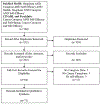Self-efficacy in caregivers of adults diagnosed with cancer: An integrative review
- PMID: 33799022
- PMCID: PMC8475617
- DOI: 10.1016/j.ejon.2021.101933
Self-efficacy in caregivers of adults diagnosed with cancer: An integrative review
Abstract
Purpose: Cancer caregivers experience health challenges related to their caregiving role, and self-efficacy can contribute to health outcomes through behavioral, environmental, and personal factors. The purpose of this integrative review was to examine self-efficacy in caregivers of adults diagnosed with cancer, including its association with health factors.
Method: A systematic search of PubMed, CINAHL, and PsychInfo yielded 560 articles. Following duplicate removal, 232 articles were screened for inclusion criteria with 71 articles remaining for final review.
Results: Studies were generally quantitative (n = 67), with predominantly female (n = 55), White (n = 36) caregivers, between the ages of 45-60 (n = 48). Self-efficacy was significantly associated with quality of life, caregiver function, social support, hope, depression, anxiety, and burden as a predictor, mediator, and outcome. Physical health and social determinants of health (social support and financial well-being) were addressed among fewer studies than mental and emotional health outcomes.
Conclusions: Addressing self-efficacy in diverse populations and within physical, mental, and social health contexts will enhance understanding of how self-efficacy impacts caregivers of adults diagnosed with cancer. Nurses and other health care professionals can then effectively address supportive needs of caregivers in the personal, behavioral, and environmental domains.
Keywords: Cancer; Caregiver; Caregiving; Health outcomes; Integrative review; Self-efficacy; Social determinants of health.
Copyright © 2021 Elsevier Ltd. All rights reserved.
Conflict of interest statement
Declarations of Interest: None
Conflict of Interest Statement
The authors declare no conflict of interest.
References
-
- American Cancer Society. 2018. Global Cancer Facts & Figures. 4th ed.Atlanta, GA: American Cancer Society.
-
- Badger TA, Segrin C, Sikorskii A, Pasvogel A, Weihs K, Lopez AM, & Chalasani P 2020. Randomized controlled trial of supportive care interventions to manage psychological distress and symptoms in Latinas with breast cancer and their informal caregivers. Psychol Health, 35, 87–106. 10.1080/08870446.2019.1626395 - DOI - PubMed
Publication types
MeSH terms
Grants and funding
LinkOut - more resources
Full Text Sources
Other Literature Sources
Medical


